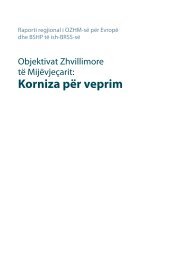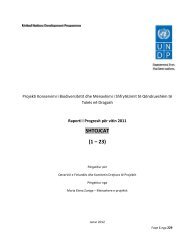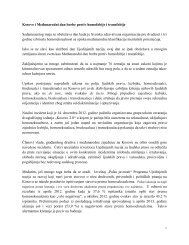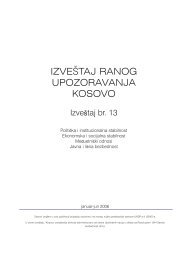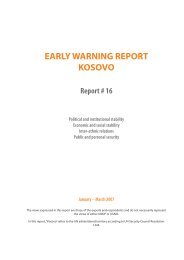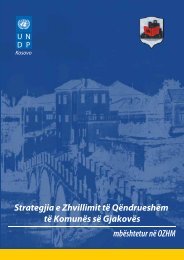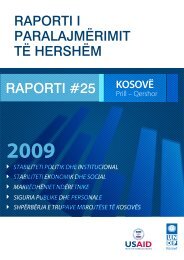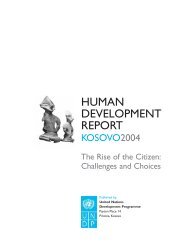Kosovo Human Development Report 2010 - UNDP Kosovo - United ...
Kosovo Human Development Report 2010 - UNDP Kosovo - United ...
Kosovo Human Development Report 2010 - UNDP Kosovo - United ...
Create successful ePaper yourself
Turn your PDF publications into a flip-book with our unique Google optimized e-Paper software.
6.1<br />
CHAPTER 6<br />
Findings and Recommendations<br />
Towards Lisbon or<br />
not? <strong>Kosovo</strong>’s stark<br />
choice<br />
In the first year of <strong>Kosovo</strong>’s recovery<br />
from its damaging conflict and the beginning<br />
of its new era, European states<br />
met in Lisbon to discuss how to make<br />
their region the most competitive and<br />
advanced union in the world. The Lisbon<br />
Strategy of 2000 linked economic<br />
development and social inclusion in a<br />
cycle, premised on the concept that<br />
human potential is the fundamental<br />
starting point for true and sustainable<br />
progress. The action plan attached to<br />
this strategy may have fallen short by<br />
<strong>2010</strong>, but it still represents a central vision<br />
for Europe’s future.<br />
<strong>Kosovo</strong>, with a past mired in internal<br />
division and its future sights firmly<br />
set on EU membership, faces a stark<br />
choice. Either it moves towards the Lisbon<br />
ideals of openness, inclusion and<br />
equal opportunity for all, or remains<br />
locked by the very challenges it once<br />
fought to escape.<br />
All Kosovans are instinctively aware<br />
that a moment of decision is before<br />
them. In October 2009, the Assembly of<br />
<strong>Kosovo</strong> released a White Paper entitled<br />
<strong>Kosovo</strong> Social Inclusion Challenges, a<br />
declaration of political commitment<br />
by the Assembly of <strong>Kosovo</strong> to address<br />
the issues of social exclusion and promote<br />
the social inclusion agenda in<br />
<strong>Kosovo</strong>. Only through participation of<br />
all people in the development process<br />
can a society prosper and achieve hu-<br />
man development. This KHDR was prepared<br />
to support these goals. It seeks<br />
to mobilize the joint efforts of a wide<br />
range of social stakeholders, including<br />
<strong>Kosovo</strong>’s authorities, civil society,<br />
development partners and socially excluded<br />
groups to advance social inclusion<br />
in all aspects of life. Without such<br />
broad social ‘buy-in’, no policy addressing<br />
social inclusion will be sustainable<br />
and effective, regardless of the best intentions.<br />
Since the Lisbon Strategy was adopted,<br />
social exclusion has become<br />
a visible phenomenon in Newborn<br />
<strong>Kosovo</strong>. This final chapter provides a<br />
synthesis of the mechanisms that perpetuate<br />
exclusion across society, hoping<br />
to inspire innovative approaches to<br />
address them.<br />
6.2<br />
“People are the real wealth of a nation”<br />
<strong>UNDP</strong> Global HDR <strong>2010</strong><br />
Significant findings<br />
and implications<br />
(i) Drivers of social exclusion in <strong>Kosovo</strong><br />
have common links across economic,<br />
education, health and political<br />
spheres<br />
• Absence of policy leadership on<br />
social inclusion issues: the lack<br />
of high-level leadership on social<br />
inclusion issues has left <strong>Kosovo</strong>’s<br />
ministries without direction. In the<br />
absence of a fully <strong>Kosovo</strong>-owned<br />
FINDINGS AND RECOMMENDATIONS<br />
| 91



